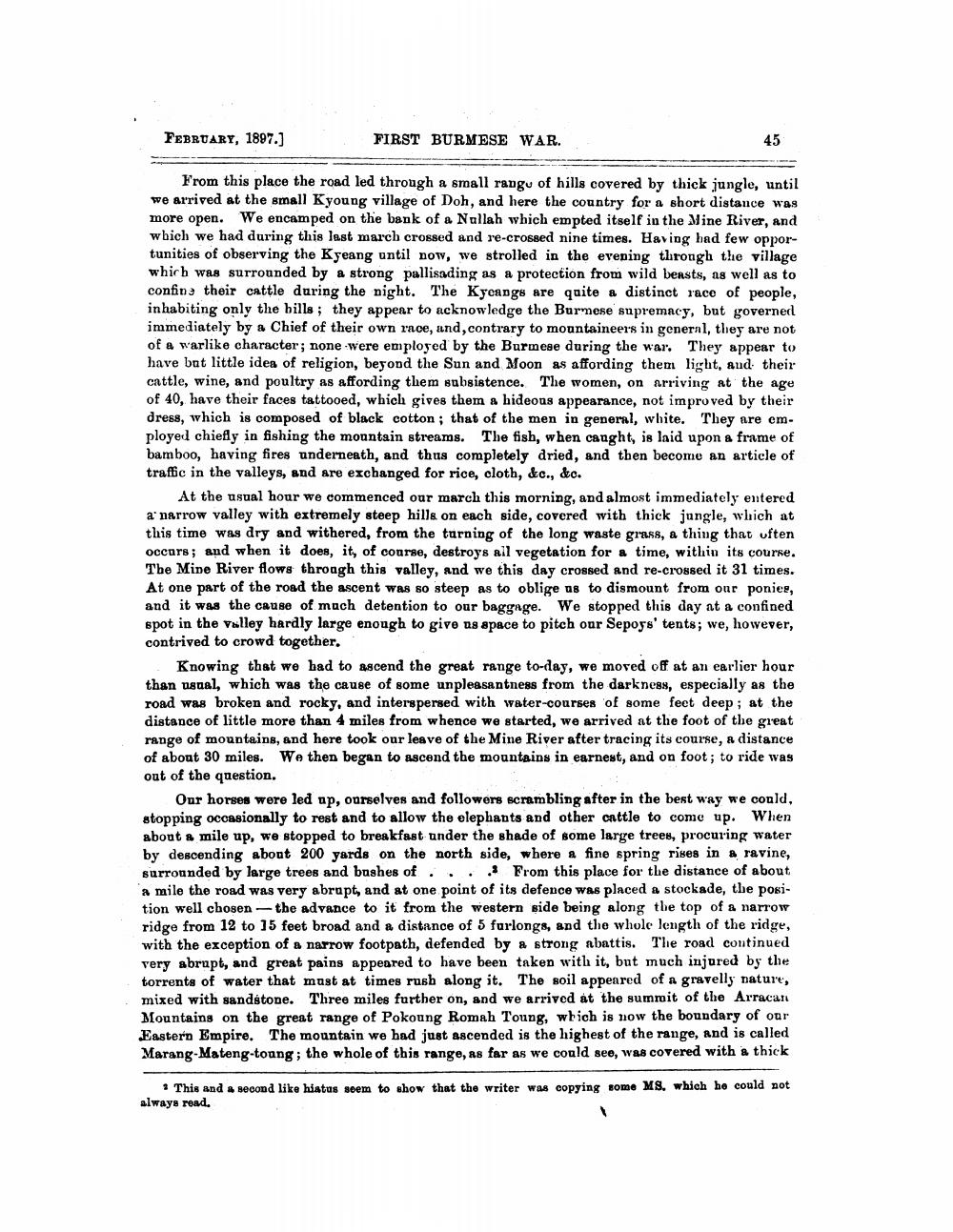________________
FEBRUARY, 1897.]
FIRST BURMESE WAR.
45
From this place the road led through a small rangu of hills covered by thick jungle, until we arrived at the small Kyoung village of Doh, and here the country for a short distance was more open. We encamped on the bank of a Nallah which empted itself in the Mine River, and which we had during this last march crossed and re-crossed nine times. Having had few opportunities of observing the Kyeang until now, we strolled in the evening throngh the village which was surrounded by a strong pallisading as a protection from wild beasts, as well as to confine their cattle during the night. The Kyeangs are quite a distinct race of people, inhabiting only the bills; they appear to acknowledge the Burmese supremacy, but governed immediately by a Chief of their own race, and, contrary to mountaineers in genernl, they are not of a warlike character; none were employed by the Burmese during the war. They appear to have but little idea of religion, beyond the Sun and Moon as affording them light, and their cattle, wine, and poultry as affording them subsistence. The women, on arriving at the age of 40, have their faces tattooed, which gives them a hideous appearance, not improved by their dress, which is composed of black cotton; that of the men in general, white. They are employed chiefly in fishing the mountain streams. The fish, when caught, is laid upon a frame of bamboo, having fires underneath, and thus completely dried, and then become an article of traffic in the valleys, and are exchanged for rice, cloth, &c., &c.
At the usual hour we commenced our march this morning, and almost immediately entered a narrow valley with extremely steep hills on each side, covered with thick jungle, which at this time was dry and withered, from the turning of the long waste grass, a thing that uften occors; and when it does, it, of course, destroys all vegetation for a time, within its course. The Mine River flows through this valley, and we this day crossed and re-crossed it 31 times. At one part of the road the ascent was so steep as to oblige us to dismount from our ponies, and it was the cause of much detention to our baggage. We stopped this day at a confined spot in the valley hardly large enough to give us apace to pitch our Sepoys' tents; we, however, contrived to crowd together.
Knowing that we had to ascend the great range to-day, we moved off at an earlier hour than usual, which was the cause of some unpleasantness from the darkness, especially as the road was broken and rocky, and interspersed with water-courses of some feet deep; at the distance of little more than 4 miles from whence we started, we arrived at the foot of the great range of mountains, and here took our leave of the Mine River after tracing its course, a distance of about 30 miles. We then began to ascend the mountains in earnest, and on foot; to ride was out of the question.
Our horses were led op, ourselves and followers scrambling after in the best way we could, stopping occasionally to rest and to allow the elephants and other cattle to come up. When about & mile up, we stopped to breakfast under the shade of some large trees, procuring water by descending about 200 yards on the north side, where a fine spring rises in a ravine, surrounded by large trees and bushes of ... From this place for the distance of about a mile the road was very abrupt, and at one point of its defence was placed a stockade, the position well chosen - the advance to it from the western side being along the top of a narrow ridge from 12 to 15 feet broad and a distance of 5 furlongs, and the whole length of the ridge, with the exception of a narrow footpath, defended by a strong abattis. The road continued very abrupt, and great pains appeared to have been taken with it, but much injured by the torrents of water that must at times rush along it. The soil appeared of a gravelly nature, mixed with sandstone. Three miles further on, and we arrived at the summit of the Arracan Mountains on the great range of Pokoung Romah Toung, which is now the boundary of our Eastern Empire. The mountain we had just ascended is the highest of the range, and is called Marang-Mateng-toang; the whole of this range, as far as we could see, was covered with a thick
* This and a second like hiatus seem to show that the writer was copying some MS, which he could not always read.




